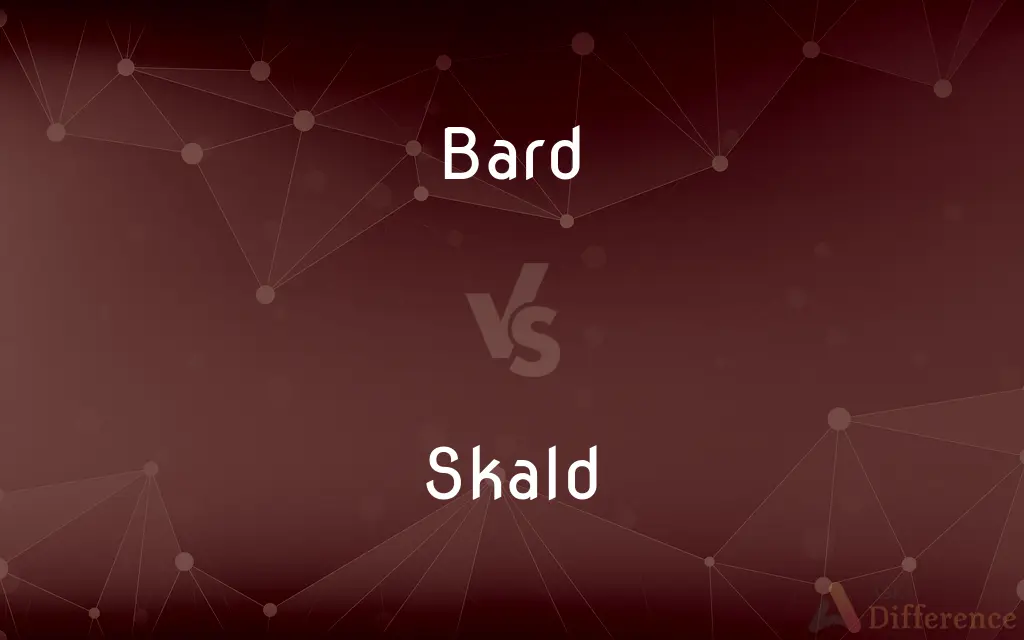Bard vs. Skald — What's the Difference?
By Tayyaba Rehman & Fiza Rafique — Updated on April 5, 2024
Bards and skalds are both historical figures known for their storytelling and musical abilities, but bards are associated with Celtic cultures, while skalds come from Norse tradition.

Difference Between Bard and Skald
Table of Contents
ADVERTISEMENT
Key Differences
Bards were poets, musicians, and storytellers in ancient Celtic cultures, revered for their ability to memorize and recite lengthy epic poems, often accompanied by a harp. They played a crucial role in preserving the oral history and cultural traditions of their people, acting as storytellers, entertainers, and historians. On the other hand, skalds served a similar purpose within Norse society, crafting and delivering verses that celebrated the deeds of Viking chieftains and gods. Skaldic poetry is known for its complex meters and kennings, unique metaphors that added layers of meaning and challenge to their compositions.
While bards often traveled between courts and communities, sharing tales that ranged from the historical to the mythical, skalds were closely tied to the Scandinavian courts, where they composed and performed poems to honor their patrons and ancestors. This patronage system provided skalds with a more defined role within their society, closely linking their art with the political and social elite. In contrast, bards could occupy a variety of social standings, from esteemed members of the court to itinerant performers.
The legacy of bards is preserved in the rich oral traditions and literature of Celtic nations, including epic poems and folk songs that continue to influence modern culture. Skaldic poetry, with its intricate wordplay and historical content, provides valuable insights into Norse mythology, society, and the Viking Age. Although the primary function of both bards and skalds was to entertain and inform, their work also served to cement social bonds, educate listeners about their history and legends, and celebrate heroism and valor.
Despite the differences in their cultural backgrounds and the specifics of their craft, bards and skalds share a common heritage as the voice of their people's history, values, and aspirations. Their storytelling, whether through song, poetry, or prose, remains a testament to the power of the spoken word in shaping and preserving cultural identity.
Comparison Chart
Origin
Celtic cultures
Norse tradition
ADVERTISEMENT
Role
Poets, musicians, storytellers
Poets, composers, often courtly figures
Composition
Epic poems, songs, oral history
Skaldic poetry, with complex meters and kennings
Performance
Accompanied by instruments like the harp
Often performed at court to honor patrons
Legacy
Preserved Celtic oral traditions and history
Provided insights into Norse mythology and Viking society
Social Standing
Varied, from court members to itinerant performers
Closely linked to the social and political elite
Cultural Impact
Influenced modern culture through literature and music
Contributed to our understanding of Norse culture and history
Compare with Definitions
Bard
A Celtic poet and musician who composed and performed epic poems.
The bard's song recounted the heroic deeds of ancient kings.
Skald
A Norse poet, known for skaldic poetry's complex structure.
The skald recited verses filled with kennings, honoring the chieftain.
Bard
Integral to cultural ceremonies and education.
At the feast, the bard sang of battles and peace, weaving history with melody.
Skald
Served at the courts of Scandinavian leaders.
The king's skald composed a poem celebrating victory in battle.
Bard
Occupied various social roles, from esteemed to itinerant.
A wandering bard arrived, bringing news and stories from afar.
Skald
Influential in the court, linking art with politics.
The skald's poem subtly praised the political wisdom of his patron.
Bard
Their work continues to influence music and literature.
Modern songwriters draw inspiration from the ancient bards' themes and techniques.
Skald
Their poetry celebrated deeds of gods and heroes.
Through the skald's words, the gods' adventures came to life for all to hear.
Bard
Storytellers who preserved and transmitted oral history.
Bards traveled from village to village, sharing tales of lore.
Skald
Played a key role in preserving Norse mythology.
Skalds passed down stories of Odin and Thor, embedding them in cultural memory.
Bard
In Celtic cultures, a bard is a professional story teller, verse-maker, music composer, oral historian and genealogist, employed by a patron (such as a monarch or noble) to commemorate one or more of the patron's ancestors and to praise the patron's own activities. Originally bards were a specific lower class of poet, contrasting with the higher rank known as fili in Ireland and Highland Scotland.
Skald
A Skald, or skáld (Old Norse: [ˈskald], later [ˈskɒːld]; Icelandic: [ˈskault], meaning "poet"), is one of the often named poets who composed skaldic poetry, one of the two kinds of Old Norse poetry, the other being Eddic poetry, which is anonymous. Skaldic poems were traditionally composed on one occasion, sometimes extempore, and include both extended works and single verses (lausavísur).
Bard
A poet, traditionally one reciting epics and associated with a particular oral tradition
Our national bard, Robert Burns
Skald
A medieval Scandinavian poet, especially one writing in the Viking age.
Bard
A rasher of fat bacon placed on meat or game before roasting.
Skald
(historical) A Nordic poet of the Viking Age.
Bard
Cover (meat or game) with rashers of fat bacon
The venison was barded and marinated
Skald
See 5th Scald.
Bard
One of an ancient Celtic order of minstrel poets who composed and recited verses celebrating the legendary exploits of chieftains and heroes.
Bard
A poet, especially a lyric poet.
Bard
A piece of armor used to protect or ornament a horse.
Bard
To equip (a horse) with bards.
Bard
To cover (meat) in thin pieces of bacon or fat to preserve moisture during cooking.
Bard
A professional poet and singer, like among the ancient Celts, whose occupation was to compose and sing verses in honor of the heroic achievements of princes and brave men.
Bard
(by extension) A poet.
Shakespeare is known as the bard of Avon.
Bard
A piece of defensive (or, sometimes, ornamental) armor for a horse's neck, breast, and flanks; a barb. (Often in the plural.)
Bard
Defensive armor formerly worn by a man at arms.
Bard
(cooking) A thin slice of fat bacon used to cover any meat or game.
Bard
The exterior covering of the trunk and branches of a tree; the rind.
Bard
Specifically, Peruvian bark.
Bard
To cover a horse in defensive armor.
Bard
(cooking) To cover (meat or game) with a thin slice of fat bacon.
Bard
A professional poet and singer, as among the ancient Celts, whose occupation was to compose and sing verses in honor of the heroic achievements of princes and brave men.
Bard
Hence: A poet; as, the bard of Avon.
Bard
Defensive armor formerly worn by a man at arms.
Bard
A thin slice of fat bacon used to cover any meat or game.
Bard
The exterior covering of the trunk and branches of a tree; the rind.
Bard
Specifically, Peruvian bark.
Bard
To cover (meat or game) with a thin slice of fat bacon.
Bard
A lyric poet
Bard
An ornamental caparison for a horse
Bard
Put a caparison on;
Caparison the horses for the festive occasion
Common Curiosities
What is a skald?
A skald is a Norse poet who composed and performed complex skaldic poetry, often at the courts of Viking leaders, celebrating their deeds and the gods.
What role did bards and skalds play in their societies?
Both played crucial roles in preserving and transmitting the oral history, culture, and values of their people through storytelling and music.
What is a bard?
A bard is a poet, musician, and storyteller from ancient Celtic culture, known for preserving oral history through epic poems and songs.
Were skalds exclusively attached to courts?
While skalds were primarily associated with the courts of Viking leaders, some also composed for wider audiences, sharing tales of gods and heroes.
How were skalds and bards similar?
Both were revered for their storytelling, poetic talents, and the vital role they played in preserving their culture's history and legends.
How did bards and skalds differ in their compositions?
Bards focused on epic poems and songs with a broad thematic range, while skalds specialized in skaldic poetry with intricate meters and unique metaphors.
Can the works of bards and skalds still influence modern culture?
Yes, the themes, stories, and poetic forms of both bards and skalds continue to influence contemporary literature, music, and cultural identity.
How did the compositions of bards and skalds reflect their cultures?
Through their storytelling and poetic forms, bards and skalds captured the essence of their respective cultures, from heroic legends to historical events and cultural values.
Why are bards and skalds important to historical understanding?
Their compositions provide valuable insights into the societal values, historical events, and cultural practices of Celtic and Norse societies.
What was the social standing of skalds compared to bards?
Skalds often held a higher, more defined social standing as members of the court, whereas bards' social status could vary more widely.
Share Your Discovery

Previous Comparison
Expletive vs. Profanity
Next Comparison
Methodologist vs. MethodistAuthor Spotlight
Written by
Tayyaba RehmanTayyaba Rehman is a distinguished writer, currently serving as a primary contributor to askdifference.com. As a researcher in semantics and etymology, Tayyaba's passion for the complexity of languages and their distinctions has found a perfect home on the platform. Tayyaba delves into the intricacies of language, distinguishing between commonly confused words and phrases, thereby providing clarity for readers worldwide.
Co-written by
Fiza RafiqueFiza Rafique is a skilled content writer at AskDifference.com, where she meticulously refines and enhances written pieces. Drawing from her vast editorial expertise, Fiza ensures clarity, accuracy, and precision in every article. Passionate about language, she continually seeks to elevate the quality of content for readers worldwide.















































